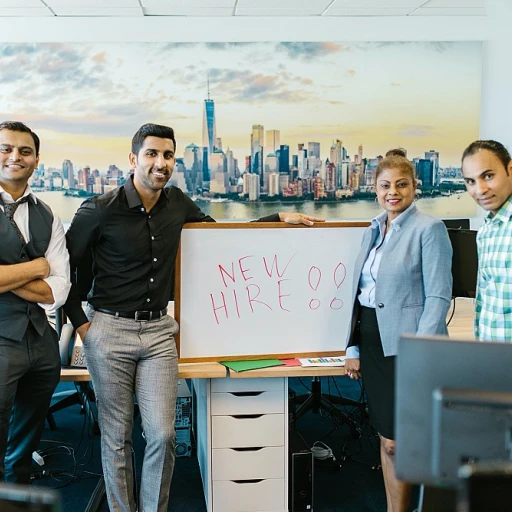
Understanding the Role and Responsibilities
Gaining Clarity on the Position
Conducting an internal interview effectively begins with a deep understanding of the job's specific role and responsibilities within the company. When interviewing for a position that an internal candidate aspires to, it's crucial to comprehend how the role aligns with the company's strategic objectives and what it entails daily.
As a hiring manager, you should frame questions that explore the current expectations and future directions of the role. This will also provide a foundation for assessing the candidate's familiarity and previous interactions with those responsibilities. Key questions internal might include:
- Can you describe what you understand about the responsibilities of this role within the company?
- How have your current role and past experiences prepared you for this position?
Asking such interview questions will not only help illuminate the internal candidate’s vision for the job, but it will also allow them to share their understanding and past contributions in a meaningful context. Furthermore, these inquiries can point out potential discrepancies between their perception and reality, which can be crucial for the candidate's integration into the role and team.
Since internal candidates may have unique insights or internal hiring advantages over external candidates, it's beneficial to tap into these during the interview process. Encouraging them to articulate their understanding of the role helps identify alignment with company priorities and team objectives.
For more insights on the integral parts of conducting interviews, the blog piece on who is responsible for conducting interviews in HR presents useful perspectives you can adopt.
Evaluating Skills and Experience
Evaluating Competence and Experience
When conducting an internal interview, it's crucial to assess the skills and experience of internal candidates to ensure they align with the requirements of the new role. This evaluation not only helps in understanding the candidate's current capabilities but also in predicting their potential success in the position.
Here are some key questions to consider during the interview process:
- How have your skills evolved in your current role? This question allows the candidate to reflect on their growth and how their skills have developed over time. It also provides insight into their ability to adapt and learn, which is essential for any new position.
- Can you provide examples of how you've applied your skills to benefit the team or company? Asking for specific examples helps the hiring manager gauge the practical application of the candidate's skills and their impact on the company.
- What additional skills do you believe are necessary for this role, and how do you plan to acquire them? This question assesses the candidate's understanding of the role's requirements and their commitment to personal and professional development.
These questions will help the hiring manager determine if the internal candidate possesses the necessary skills and experience for the job. Additionally, understanding their ability to apply these skills in real-world scenarios is crucial for making an informed hiring decision.
For more insights on preparing for a job interview, consider exploring essential items to bring to your job interview.
Assessing Cultural Fit
Determining Cultural Compatibility
In the realm of talent acquisition, especially when conducting an internal interview, it's crucial to assess how well candidates will mesh with the existing company culture. The dynamics within a team can be delicate and ensuring that an internal candidate fits harmonizes various aspects of the organization is a key consideration for any hiring manager. Understanding cultural fit goes beyond what is on paper. It's not just about qualifications or the experience highlighted in a previous job interview. It's about whether the candidate's values align with the company's ethos and whether they will thrive in their current role while contributing positively to team dynamics. Engage with questions designed to explore cultural compatibility, such as:- How do you perceive our company's mission and values?
- Can you share an experience where you had to adapt to a new team or work culture?
- What aspects of our company culture do you find most appealing?
Identifying Career Aspirations
Unveiling Career Growth and Professional Goals
In an internal interview, evaluating an internal candidate’s career aspirations can provide the hiring manager with insights into their long-term vision with the company. This helps ensure alignment not only with the position but also with the overall strategic goals of the organization.
Here are crucial questions to consider during the interview:
- Where do you see yourself in the next few years? This question helps understand if the candidate's ambitions align with the trajectory of the department and the company as a whole.
- What skills or experiences are you hoping to develop in your current role? Understanding their developmental needs can aid the team in supporting their career growth effectively.
- How do you think this job will help you achieve your career goals? The answer will provide insights into the candidate’s perspective on how this new role supports their broader professional journey.
Sharing these detailed responses can also help the team identify potential avenues for learning and development, thereby reinforcing the internal candidate’s commitment to growing within the organization. This aspect complements evaluating skills and experience since it may highlight any gaps that might need addressing through training or mentorship.
Ultimately, understanding an internal candidate's career aspirations not only informs the decision-making process in making internal hiring but also strengthens the connection between the individual and the company's future, driving mutual growth and success.
Exploring Motivation and Engagement
Understanding Motivation and Commitment
In the internal interview process, comprehending the motivation and engagement levels of a candidate could greatly aid the hiring manager in aligning the candidate's objectives with the company's needs. A deep dive into why an internal candidate seeks the position can offer invaluable insights into their drive and commitment. Key questions surrounding motivation could be:- Why are you interested in this role and what excites you about it?
- How do you believe this position will contribute to your professional growth and career path?
- Can you share a moment when you went above and beyond in your current role?
Addressing Potential Challenges
Unveiling Honesty and Resilience
Conducting an internal interview provides a unique opportunity to uncover a candidate’s potential challenges while transitioning into a new role or advancing within the company. Internal candidates may have developed certain expectations about their current position and overall career path. It is essential for hiring managers to address these potential hurdles, ensuring a smooth and transparent interview process. Consider asking thoughtful questions about potential challenges in the job to reveal a candidate's transparency and problem-solving abilities. These questions will help both the hiring team and the candidate identify areas that might require additional support or development:- In your opinion, what challenges do you foresee in taking on this new role?
- This question allows candidates to reflect on their skills and experience, while also showcasing their ability to foresee and strategize around potential obstacles.
- How do you plan to balance the responsibilities of your current position with the demands of this new opportunity?
- Here, candidates can demonstrate their organizational and time-management prowess, which is crucial in transitioning from their current role to the new one.
- Can you share a time when you faced a significant challenge in your current job? What steps did you take to overcome it?
- This question invites candidates to provide a sample answer that highlights their resilience and resourcefulness, adding depth to their candidacy.













